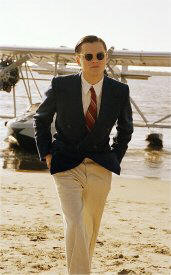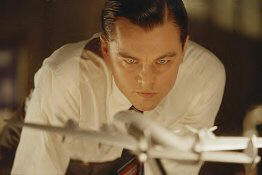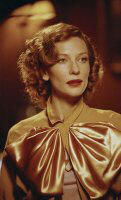 There are few, if any figures of the twentieth century who can claim to have influenced and changed not one but two American industries the way Howard Hughes did. Hughes’ airline concerns helped advance the cause of international air travel while his work as a film producer resulted in the discovery of actresses like Jean Harlow and Jane Russell and showed that successful films could be made outside the standard studio system of the time. The Aviator, covering nearly two decades of Howard Hughes in Hollywood, is an American success story and an American tragedy- soaring the highest heights, spiraling to catastrophic lows.
There are few, if any figures of the twentieth century who can claim to have influenced and changed not one but two American industries the way Howard Hughes did. Hughes’ airline concerns helped advance the cause of international air travel while his work as a film producer resulted in the discovery of actresses like Jean Harlow and Jane Russell and showed that successful films could be made outside the standard studio system of the time. The Aviator, covering nearly two decades of Howard Hughes in Hollywood, is an American success story and an American tragedy- soaring the highest heights, spiraling to catastrophic lows.
Not surprisingly, given director Martin Scorsese’s oft-professed love of Hollywood history, Aviator opens with the production of Hughes’ multi-million dollar epic film Hell’s Angels. (Hell’s Angels is currently available on DVD from Universal Studios in a rather disappointing no-frills edition.) However, the segment does highlight two important aspects of Hughes’ personality. As a perfectionist, Hughes kept stunt pilots on salary months, inactive until the right clouds appeared in the California skies to offset the aerial action he wished to shoot. As a visionary, Hughes went back and re-shot almost the entire film after it had wrapped, sensing that the newly introduced novelty of “talking” pictures was to be the wave of the future. Aviator also spends time on Hughes’ long time affair with Katherine Hepburn (Cate Blanchett) and to a lesser extant Ava Gardner (Kate Beckinsale) and Faith Domergue (Kelli Garner) while only passing mention is made of several other dalliances he participated in over the years.
 Howard Hughes has figured in films before, from the black comedy Melvin And Howard (1980) where he was portrayed by Jason Robbards to The Rocketeer (1991), which had Hughes (essayed by Terry O’Quinn) as the secret inventor of the eponymous hero’s rocket pack. However, Aviator is the first film (leaving aside the 1977 tele-movie The Amazing Howard Hughes starring Tommy Lee Jones) to focus solely on Hughes the man, neither idolizing nor demonizing him. The film depicts a man with the desire to be the top of his chosen fields, but seemingly uncomfortable with the fame and accolades that his success brought. We’re shown flashes of Hughes almost instinctual knowledge of aeronautics and what was needed to make his planes better than his competition’s craft.
Howard Hughes has figured in films before, from the black comedy Melvin And Howard (1980) where he was portrayed by Jason Robbards to The Rocketeer (1991), which had Hughes (essayed by Terry O’Quinn) as the secret inventor of the eponymous hero’s rocket pack. However, Aviator is the first film (leaving aside the 1977 tele-movie The Amazing Howard Hughes starring Tommy Lee Jones) to focus solely on Hughes the man, neither idolizing nor demonizing him. The film depicts a man with the desire to be the top of his chosen fields, but seemingly uncomfortable with the fame and accolades that his success brought. We’re shown flashes of Hughes almost instinctual knowledge of aeronautics and what was needed to make his planes better than his competition’s craft.
Yet, oddly enough, for all the portrayal of Hughes’ drive to develop fast panes and expand his aviation empire, we are never really shown what sparked that drive or how his love affair with flying was sparked. Nor does the film explore any of the possible reasons for Hughes germ phobia, obsessive-compulsive disorder or growing paranoia, leaving audiences to wonder if it was due to a close brush with death during a childhood Cholera epidemic, too many mis-adventurous blows to the head or something else entirely.
 While his baby face may not make him look totally convincing as Hughes in his 40s, Leonardo DiCaprio gives a strong turn as the troubled genius Hughes, never overplaying either the brash youthful Hughes or the moments when his germ phobia or OCD threatened to overwhelm him. Alec Baldwin is suitably slimy as Juan Trippe, head of Pan Am airlines and Hughes chief rival, while Alan Alda thoroughly sheds any remains of his jovial M*A*S*H persona with his portrayal of a Commerce Committee senator in Trippe’s pocket. The strongest of all the supporting roles is Blanchett’s Hepburn, here as fiery a woman as one would expect from the real Hepburn’s on screen persona.
While his baby face may not make him look totally convincing as Hughes in his 40s, Leonardo DiCaprio gives a strong turn as the troubled genius Hughes, never overplaying either the brash youthful Hughes or the moments when his germ phobia or OCD threatened to overwhelm him. Alec Baldwin is suitably slimy as Juan Trippe, head of Pan Am airlines and Hughes chief rival, while Alan Alda thoroughly sheds any remains of his jovial M*A*S*H persona with his portrayal of a Commerce Committee senator in Trippe’s pocket. The strongest of all the supporting roles is Blanchett’s Hepburn, here as fiery a woman as one would expect from the real Hepburn’s on screen persona.
The film is packed with a few winks towards Hollywood’s history for viewers to discover. When being introduced to Metro-Goldwyn-Mayer studio honcho Louis B Mayer, we overhear him commenting on positive test reaction for the now legendary lost Lon Chaney silent film London After Midnight and Cecil B/ DeMille’s “Bible epic.” Jude Law and pop-star Gwen Stefani appear briefly as Errol Flynn and Jean Harlow respectively. Acting stalwarts Ian Holm, Jane Lynch, Brent Spiner, Edward Herrmann and Willem Dafoe all contribute memorable moments as well. Big Band fans may get a chuckle out of Scorsese’s ironic use of the classic “Nightmare” to underscore portions of Hughes’ mental breakdowns, as it was composed by Artie Shaw, the one-time husband of Hughes’ sometimes paramour Ava Gardner.
Not surprisingly, the film’s pacing parallels Hugh’s mental state. The first third of the film moves along at a brisk pace, fueled by DiCaprio’s portrayal of Hughes as a young firebrand, brash and cocksure in his decisions in the face of his skeptics. However, once his own mental illnesses begin to overtake him, the film bogs down into a slow moving middle, finally recovering to a finish as Hughes pulls himself together enough to face a Congressional hearing with the fate of his business empire hanging in the balance.
Unlike the films of Hollywood’s golden era in which he lived, Hughes’ own story does not contain a happy ending. His descent into mental illness is a well-known part of American folklore and, rather than dwell on the sordid details, the film ends on a bittersweet note- Hughes last public triumphant overshadowed by a hint of the madness that would soon overtake his life.

